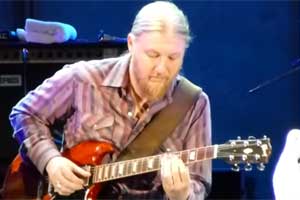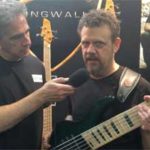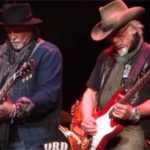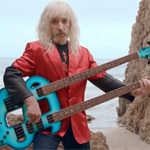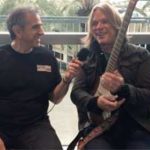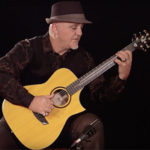First-hand account of his formidable, and still growing, six-string career
By Gary Graff
August 12, 2016
Derek Trucks is a bit of a rock ‘n’ roll Zelig. The Florida-born guitarist and bandleader is the nephew of Allman Brothers Band drummer Butch Trucks but found his own way into the guitar at a young age, playing his first paying gig when he was 11. He formed the Derek Trucks Band while he was still a teenager but went on to play in the Allmans in addition to Eric Clapton during the mid-2000s, as well as on several of Ol’ Slowhand’s albums. You can also find Trucks on albums by a broad array of other artists, ranging from Gregg Allman, Elvin Bishop and Buddy Guy to Herbie Hancock, McCoy Tyner, Bela Fleck and David Sanborn. These days, however, the focus is on the Tedeschi Trucks Band, which he formed six years ago with his wife, singer-songwriter Susan Tedeschi (not too shabby a guitarist herself); so far the group has released three studio albums, including this year’s Let Me Get By, and after all these years of playing with others he’s found a musical home, literally and figuratively, that’s commanding his full attention.
FGPO: Growing up with an uncle in a major band, did music feel like the family business?
Trucks: Not really. When I was growing up my dad was a roofer in north Florida, so the Allman Brothers, it was around but I wasn’t that close to it. I wasn’t around my uncle a ton, and it just wasn’t thought of that way. When my dad would listen to the records, he’d listen to Dickey (Betts) and Duane (Allman) and the guitar, that moved him, and I guess it got into me, too.
FGPO: So how did you get started?
Trucks: I got a guitar at a garage sale. It was pretty random. It never felt like anything more than a hobby I would pick up at that point. It kind of happened quickly; when you’re a kid you don’t really think about it. If you take to something it comes naturally, and you don’t overthink it. I just started playing, and the next thing I knew I’m sitting in at a local blues club, and then they invited me to tour a little bit. My dad would travel with me on the weekends. So I hit the road, and one things leads to another and you’re in it.
FGPO: Do you still have that first guitar?
Trucks: Oh, yeah. [laughs] It was pretty beat-up, pretty unplayable over the years; I think it sat in our garage and got hot. So a couple years ago for my birthday my wife went to Paul Reed Smith, the guitar maker, and sent him my first two guitars and he fixed them up so they’re playable again. It’s just a Kay knock-off, like a sub-Kay guitar. I think I paid five bucks for it.
FGPO: So how did your dad, and your mom, for that matter, feel about you joining the Allmans back in 1999?
Trucks: Well, y’know, that band’s story is pretty unreal with all the stories of Duane [Allman] and Berry [Oakley] and Lamar [Williams] and Allen Woody and all those other people. When I think back to all the ups and downs it, almost seems fictional. But, yeah, right before the end I got a call from my dad; He was like: “Do me a favor — It’s time for you to step away. Don’t hang on. You need to get away.” [laughs] It’s almost like a sense of “You gotta get out while you can.”
FGPO: After 15 years on and off in the group, were you happy with the way the Allman Brothers Band ended back in 2014?
Trucks: Y’know, I was. By the time we got to those last shows at the Beacon [Theater in New York], especially the last two nights, it was pretty magical. It felt like it was an appropriate send-off of a band with that weight and power, even if it’s just that version of the band. Who knows what’ll happen going forward with all the other guys, but if that is the last show the band ever does, it was about as good as it could have been. Everybody really stepped it up. I was proud of everybody in the band.
FGPO: Now twinges of regret or thoughts about reuniting?
Trucks: Y’know, there wasn’t. There was definitely a sense of: “This is a damn good band. This music is a lot of fun to play.” There was a lot of that. For me there was a lot to be thankful for and a lot to be humble about, and to be part of the ride for any point is great, but for that much of it was nothing I thought I would ever get to do. But I never had that feeling of: “Maybe we shouldn’t lay it down.” It felt like it was headed to the right spot.
FGPO: You and Warren Haynes got to play some of Duane’s old guitars at the final shows. Was there a temptation to maybe walk off with one as a reward for your years of service?
Trucks: [laughs] There were a few times me and Warren were both playing those guitars and you looked back and you could see the look on Butch’s face; it wasn’t lost on him what was happening. There were some poignant moments. But, man, I was actually scared to even carry that thing. Galadrielle, Duane’s daughter, asked me if I would take the cherry sunburst Les Paul on the road for the next month or two to play it; it hadn’t been out of the museum for awhile. I was actually carrying it back to the hotel that night and thinking: “This is worth more than my house and everything in it! I have to get handcuffs for this guitar case!” So that thing traveled with me for a minute. I think that guitar needed to be aired out and stretch it legs a bit and come alive again. It had a presence, there was no doubt about that.
FGPO: You logged time playing with Eric Clapton, too. Were you surprised by the recent news about his neurological issues?
Trucks: I’ve stayed in touch with him since I played with him. I knew he was going through some health things. I didn’t know it was directly affecting his guitar playing. Any time you’re having any pain like that, especially if it’s back-related or whatever, you never know where it’s going to lead to. It wasn’t a total shock, but when I heard it was getting to a point where he didn’t think he could play anymore, that’s pretty serious.
FGPO: The Allmans’ end finally allowed you to devote your full attention to the Tedeschi Trucks Band, which must be nice?
Trucks: Yeah, for sure. That was really the first time it felt that way. Up ’til then it’s been two or three months at a time, and then you kind of switch gears. So it took a minute for it to register that I’m not switching gears anymore; you get to focus in and really grind something out. So it’s been nice to think about making an album and going on tour without any other distractions. It’s been liberating, that’s for sure.
FGPO: Did it change the esprit de corps, too?
Trucks: Absolutely. I think you could feel it pretty immediately within the band. It just feels more like a solid band. They’ve always put everything they had into it, but I think everybody feels safer now just plowing full-steam ahead the way we prepared for this record and writing as a band. It has to throw you a little bit when you’re charging down the road and then one of the co-leaders is off for two or three months at a time doing other things. So it’s nice to be able to point the bus in one direction and just roll. I think it really solidified things.
FGPO: One thing the band definitely shares with the Allmans is that improvisational ethos. That’s just part and parcel of who you are, musically, right?
Trucks: For sure. I think with me growing up with the idea of what Duane and the Allman Brothers created in the beginning, knowing it changed and morphed into some other things, I always wanted to be part of a band where the energy comes from a lot of different places. Obviously there’s got to be a leaders and a place it runs through or it’s just chaos. But I want it to be a situation where everybody feels like they can contribute and give what they have. You play differently when you’re in that kind of situation. There’s times when the rhythm section gets going, you can feel they’re giving it everything they’ve got and there’s no blockage and they feel like they’re playing for the group and for themselves and for the cause and the whole thing. That’s hard to get to, and when everybody’s going at it like that…wow, man.
FGPO: Do you still get the call to do other cool things with other people?
Trucks: Sure. Ideas come up. I’ll record with other people from time to time, but I’m enjoying just being able to focus on this one thing for awhile. I’ve never had a chance to do that in my adult life, so I’ve been saying no a lot more than yes lately. That doesn’t really come naturally, but it’s nice to be able to just focus on this. I feel like when you’re fulfilled doing what you’re doing, you can enjoy somebody else’s project from afar and not necessarily want to play on it. I like listening as much as playing.
